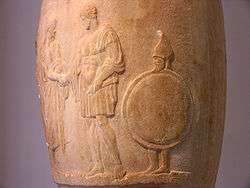Meno's slave
Meno's slave is a character in the Socratic dialogue Meno (82b–85b), which was written by Plato.

Socrates demonstrates his method of questioning and recollection by questioning a slave boy who works in Meno's house. This house slave is ignorant of geometry. The subsequent discussion shows the slave capable of learning a complicated geometry problem. Socrates, however, argues that the slave could not have learned it from Socrates, since Socrates did nothing but ask him questions; therefore, he must have remembered it from a previous life. In this way, Socrates shows Meno that, though learning is impossible, teaching is possible by helping someone recall something he already knew; and that the soul is immortal.
The discussion of Socrates and the house slave
_drawing_29.gif)
By drawing geometric figures in the ground Socrates demonstrates that the slave is initially unaware of how to find twice the area of a square.
Socrates notes that before he questioned the slave, who had been picked haphazardly from Meno's entourage, the boy would have thought himself able to speak "well and fluently" on the subject of a square double the size of a given square.[1] Without Socratic questioning, the slave boy would have remained confident in his ignorance and not have "attempted to look for, or learn, what he thought he knew (though he did not [know])." Socrates comments that this "numbing" he caused in the slave did him no harm.[2]
Socrates then draws a second square figure on the diagonal so that the slave can see that by adding vertical and horizontal lines touching the corners of the square, the double of its area is created. He gets the slave to agree that this is twice the size of the original square and says that he has "spontaneously recovered" knowledge he knew from a past life[3] without having been taught. Socrates is satisfied that new beliefs were "newly aroused" in the slave.
References
- Plato, Meno, 84c
- Plato, Meno, 84b
- Plato, Meno, 85d